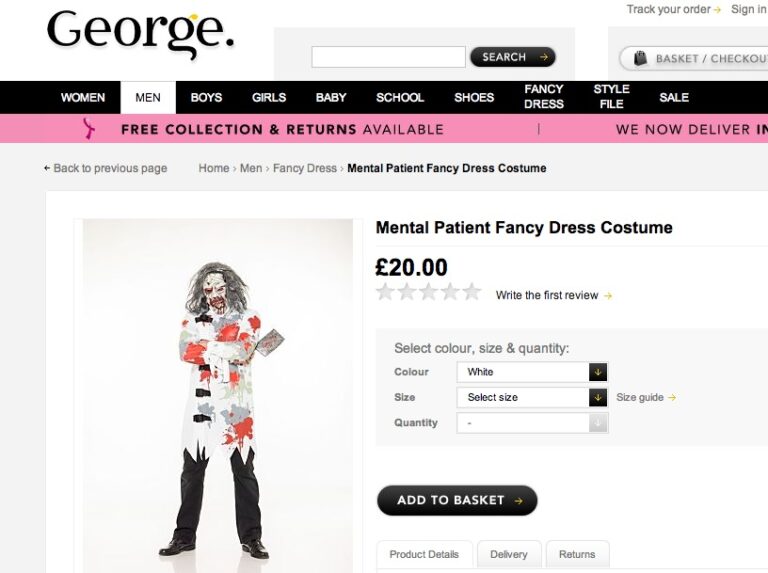When companies cock-up, is just saying sorry then paying a charity “fine” the best solution?

Recent corporate cock-ups, such as Asda and Tesco’s mental patient/psycho ward Halloween costume fiascos, set the internet on fire.
The flickering embers of angry tweets fired-off by disgruntled individuals, often demanding a massive donation to charity, suddenly get swept up by a howling wind of widespread outrage that’s fanned by tabloids intent on stoking up a good story. Unless these situations are swiftly brought under control, corporate images can quickly succumb to third degree burns.
The social media onslaughts are relentless, often error-ridden, but the demands are clear: an explanation, a grovelling apology, a promise not to do it again and, above all, a cash donation to a relevant charity.
Advertisement
This wave of what I call ‘vigilante fundraising’ isn’t new. Witness the million quid the former News of the World dished out to several charities dealing with the issues raised by its fall from grace. Not that it had that far to fall, although that didn’t stop causes scrambling to advertise in its final edition. Several energy companies too have paid pretty hefty charity ‘fines’ recently, by way of a quick smack on the chops for their unsavoury sales tactics and misinformation campaigns.
A small price to pay for goodwill?
But what happens after the cheque’s been presented, banked and the flames have died down? Have lessons really been learnt and is a tail-between-the-legs-delivered donation ever enough? Let’s face it, the sums usually involved are a relatively small price to pay for the goodwill speedly returned after such transgressions.
Let’s consider Tesco’s latest error of judgement whereby it’s allowed untold copies of its Christmas catalogue to be published with a picture of a chalkboard displaying the text: “All I want for Christmas is a puppy”. It’s a stupid mistake, as anyone with a modicum of interest in animal welfare will be more than familiar with the Dog’s Trust’s iconic message that “A dog is for life, not just for Christmas.” Indeed, having spent this summer nursing one of my dogs back to relative health from a life-threatening illness and high-risk surgery, the concept of a “A dog is for life”, and the level of commitment they require, resonates with me on a very personal level.
This error has the potential, albeit unintended, to severely weaken the impact of that message, not least because the offending text is being swooned over by a child contemplating festive gifts. What’s more, this comes at a time when Battersea Dogs & Cats Home has just launched a new range of branded toys I understand are due to go on sale at Tesco during the next few weeks.
Such cock-ups present far bigger opportunities
Having been pretty slow off the mark on this one, with Tesco responding robotically via Twitter, the latest we’re told is that it’s in discussion with Dogs Trust about how best to put this matter right. I hope this doesn’t just take the form of a cheque presentation, complete with obligatory smiley photograph, as I feel such situations yearn for a deeper and ongoing engagement between the companies and causes affected. Indeed, such cock-ups present far bigger opportunities.
For example, Tesco has 427k staff and over 100k Twitter followers. For Asda, it’s 150k and 175k respectively. Each enjoy millions upon millions of interactions with customers each year; in store, through magazines, direct mail, online and through print and TV advertising. These channels offer a far more sustainable way through which to right a wrong and reinforce sound messages. They offer priceless ways to educate and re-educate millions of people whilst also offering the affected causes fantastic opportunities to reach new donors.
So what might Tesco do after its recent paw show? Well, as it’s clearly already in the dog-house, I think those directly responsible could volunteer to spend New Year’s Eve in a rescue centre kennel whilst Tesco engages all its marketing power to raise significant sponsorship from, and awareness amongst, staff, customers and suppliers. Or how about a Twitter fundraising/information campaign with Tesco donating £1 per tweet sent using the hashtag #ADogIsForLifeNotJustForChristmas ?
Both ideas would be great ways to make amends, powerfully reinforcing the “A dog is for life message” whilst raising funds. The press would love it and, dare I say it, Tesco might come out of this with its tail wagging too.
In these circumstances, writing a cheque’s too easy, even though every little yelps.
John Thompson
Director, Changing Business
@JTCHANGINGBIZ







